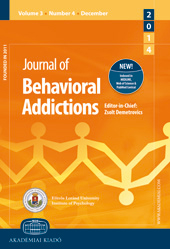Relationship between attention-deficit hyperactivity disorder symptoms and problem gambling: A mediation analysis of influential factors among 7,403 individuals from the UK
Relationship between attention-deficit hyperactivity disorder symptoms and problem gambling: A mediation analysis of influential factors among 7,403 individuals from the UK
Author(s): Louis Jacob, Josep Maria Haro, Ai KoyanagiSubject(s): Behaviorism
Published by: Akadémiai Kiadó
Keywords: attention-deficit hyperactivity disorder symptoms; problem gambling; risk factor; mediation analysis; United Kingdom
Summary/Abstract: Our goal was to examine the association between attention-deficit hyperactivity disorder (ADHD) symptoms and gambling problems, and to identify potential mediating factors of this association. Methods. This study used cross-sectional, community-based data from 7,403 people aged ≥16 years who participated in the Adult Psychiatric Morbidity Survey 2007. ADHD symptoms were assessed using the Adult ADHD Self-Report Scale (ASRS) Screener. Problem gambling was assessed using a questionnaire based on the 10 DSM-IV diagnostic criteria for pathological gambling. Respondents were classified as having no problem, at-risk, or problem gambling. Logistic regression and mediation analyses were conducted to analyze the association between ADHD symptoms (i.e., ASRS score ≥14) and problem gambling and the role of several variables in this association. Results. The prevalence of at-risk (5.3% vs. 2.4%) and problem gambling (2.4% vs. 0.6%) was higher in individuals with ADHD symptoms than in those without ADHD symptoms. ADHD symptoms were significantly associated with both at-risk (OR = 2.15; 95% CI = 1.22–3.79) and problem gambling (OR = 3.57; 95% CI = 1.53–8.31) when adjusted for age, sex, and ethnicity. Common mental disorders (CMDs; i.e., depression and anxiety disorders) (mediated percentage = 22.4%), borderline personality disorder (BPD) traits (22.1%), stressful life events (13.2%), stress at work or home (12.6%), alcohol dependence (11.8%), and impulsivity (11.2%) were significant mediators in the ADHD–gambling association. Discussion and conclusions. Overall, ADHD symptoms were positively associated with problem gambling. CMDs, BPD traits, and stressful life events were important mediators in this relationship.
Journal: Journal of Behavioral Addictions
- Issue Year: 7/2018
- Issue No: 3
- Page Range: 781-791
- Page Count: 11
- Language: English

